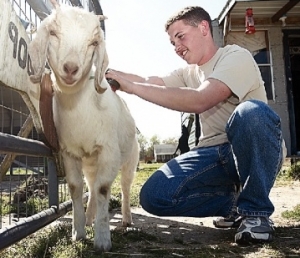Preparing county livestock for sale
By Laura Collins
Published in News on April 5, 2010 1:46 PM

News-Argus/MICHAEL BETTS
Bradley Glover, a sophomore at Charles B. Aycock High School, grooms what he hopes will be his Wayne County Junior Livestock Show and Sale award-winning goat Trixie at his grandfather Grover Medlin's farm in Pikeville.
With the 62nd Annual Wayne County Junior Livestock Show and Sale just around the corner, area students are putting the finishing touches on their animals.
The show and sale will feature about 60 participants showing meat goats, market hogs or feeder calves Wednesday and Thursday at the Wayne County Fairgrounds.
Bradley Glover, a sophomore at Charles B. Aycock High School, will participate in the event for the first time. Since January, he has been raising a meat goat, tending to her every day from about 3 p.m. until 7 or 8 p.m.
"When I get home from school, I go feed her, get her out and make her walk with me and practice her stance for the judges," he said.
Glover, who plans on being a veterinarian, said the entire process has been a good learning experience for him.
"The best part is learning from others that have been a a part of it for a lot longer and how to make it better next year," he said.
As for his meat goat, Glover said she is making progress.
"I think she's pretty much ready for next week. She's walking good," he said. "I'm having a lot of fun, and I'm really looking forward to it."
Those participating in the livestock event are Wayne County residents ages 5 to 19, or residents of a surrounding county who are members of the Wayne County 4-H program. Preparation for the event began in January when the participants got their animal, some of which are showing more than one this week.
"For many of them it's a learning experience. They learn and develop basic responsibility skills," said Eileen Coite, Wayne County Cooperative Extension agent.
The participants are required to keep detailed records of expenses including supplies, bedding and food so it can be subtracted from the sale price to determine what they earned.
"It's like a business thing for them," Ms. Coite said. "They keep up with records and see what kind of profit they made."
The event culminates with an auction of the animals. The students are paid for their animal by the pound. Typically the rate is between $1.50 to $3.50 per pound, but sometimes it can be higher. In 2009, the show and sale brought in $40,000.
